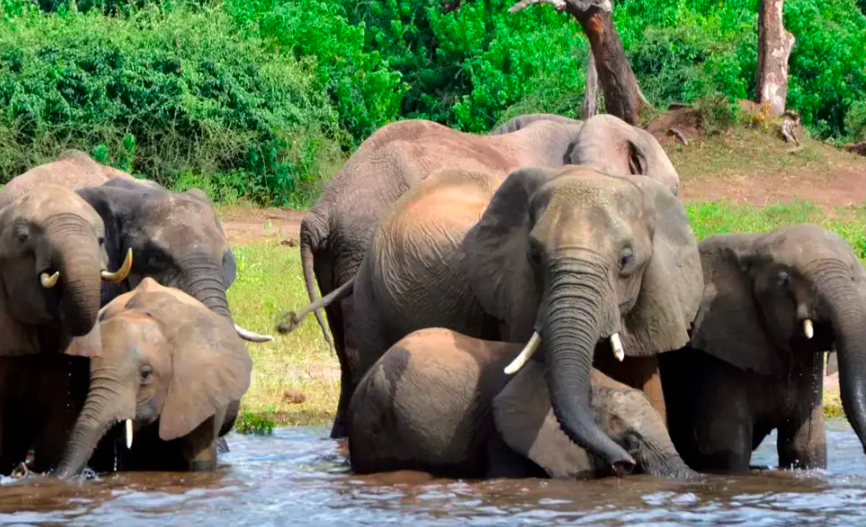Wildlife Economies Summit ends with new commitments to nature-based tourism
Gabon and Zimbabwe to work to attract more visitors by launching initiatives aimed to attract tens of millions of pounds of investment

Your support helps us to tell the story
From reproductive rights to climate change to Big Tech, The Independent is on the ground when the story is developing. Whether it's investigating the financials of Elon Musk's pro-Trump PAC or producing our latest documentary, 'The A Word', which shines a light on the American women fighting for reproductive rights, we know how important it is to parse out the facts from the messaging.
At such a critical moment in US history, we need reporters on the ground. Your donation allows us to keep sending journalists to speak to both sides of the story.
The Independent is trusted by Americans across the entire political spectrum. And unlike many other quality news outlets, we choose not to lock Americans out of our reporting and analysis with paywalls. We believe quality journalism should be available to everyone, paid for by those who can afford it.
Your support makes all the difference.Gabon and Zimbabwe this week announced their commitment to attracting more tourists to their national parks through securing investment that will help support wildfire protection and the local communities.
The proposals were announced at the close of the African Union and UN Environment Africa Wildlife Economy Summit in Victoria Falls in Zimbabwe, attended by the presidents of Zimbabwe, Botswana, Zambia, and Namibia, and ministerial delegations from more than 12 African countries.
Both countries will be partnering with the international conservation body Space for Giants to implement the charity’s Conservation Investment Initiatives. In Zimbabwe, Space for Giants - which The Independent supports in its conservation work - will be working hand-in-hand with the African Wildlife Foundation and the World Bank on the process.
The steps undertaken in both countries will be based on Space for Giant’s Uganda pilot, which is on course to unlock $60m of business investment into the country in less than two years, and will be guided by the Conservation Investment Toolkit that Space for Giants launched at the same Summit a day earlier.
The Toolkit guides African governments to attract responsible tourism businesses to invest in protected areas under transparent contracts designed to increase socio-economic development while also bringing new money to fund conservation.
Announcing the Zimbabwe initiative at the Summit, Alistair Pole, AWF’s Senior Director for East and Southern Africa, said: “We’re very proud that between Space for Giants, the World Bank and African Wildlife Foundation, we’ve been requested by the Government of Zimbabwe through the Ministry of Environment, to carry out a similar process in Zimbabwe.
“We’ll be starting as soon as possible, aiming to bring the right kind of investment into Zimbabwe, into the tourism space but also into public-private partnerships and public-private-community partnerships as well.”
Both the Zimbabwe and the Gabon processes are expected to launch officially with Conservation Investment Forums during 2020, the Summit’s 450 delegates heard. That will be after significant work to scope investment sites and streamline business processes.
Unlike Zimbabwe, where there is a long-established tourism industry, in Gabon international visitor numbers are low despite extraordinary natural assets including populations of forest elephants estimated at more than 50,000.
“The potential for nature-based tourism is huge in Gabon, but there’s a time window which is not infinite and I think we’ve absolutely picked the right time to embark on this journey,” said Noureddin Bongo, Space for Giants’ representative in Gabon.
“Space for Giants can bring its experience from Uganda to start the same discussions between the private sector and government, so that investors feel secure enough to invest their money.
“In the end, with increased benefits from conservation, Gabon’s people find their interests aligned with the government’s and conservationists, while our rainforest is protected, our economy diversifies from oil and manganese, and we protect our elephants.”
The Conservation Investment Initiative is designed to bring new private capital to conservation areas so they can earn African governments significantly increased revenue, while also providing jobs, buying from local suppliers, and protecting ecosystems.
“We strongly believe that the right type of nature-based tourism done in the right areas in a sustainable fashion is a powerful conservation tool,” said Oliver Poole, Executive Director of Space for Giants’ Giants Club.
“That’s because it creates jobs for the local community, and it brings visitors to the national parks, creating money for wildlife services, that often have limited budgets. But it also starts building a nature-based tourism sector that pays taxes and builds economies, making them of national importance and therefore more likely to be protected.”
Join our commenting forum
Join thought-provoking conversations, follow other Independent readers and see their replies
Comments